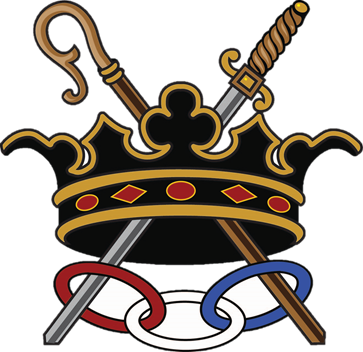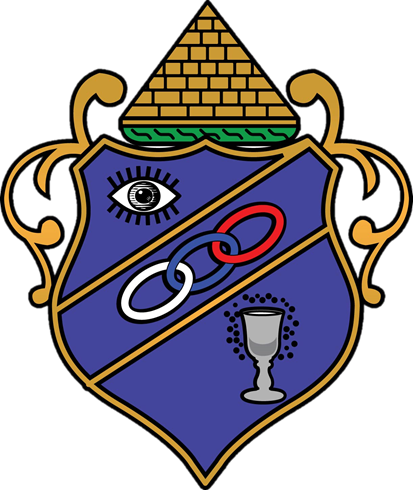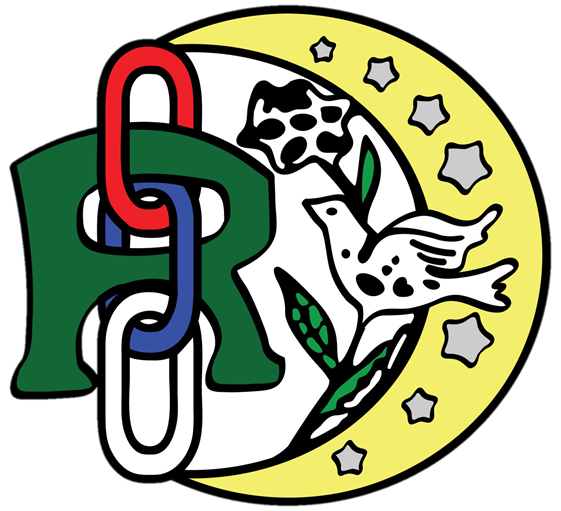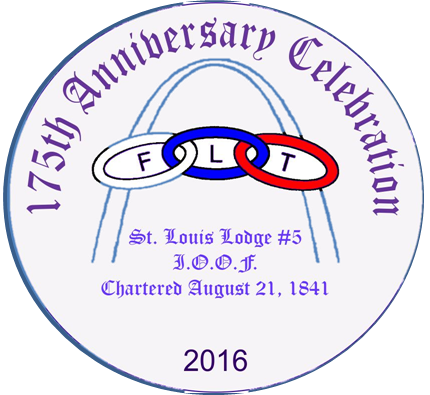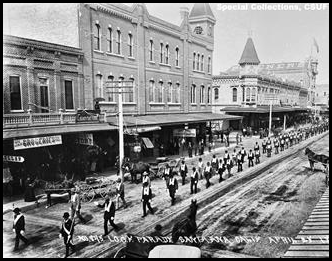
The 72nd anniversary of the Independent Order of Odd Fellows in 1891
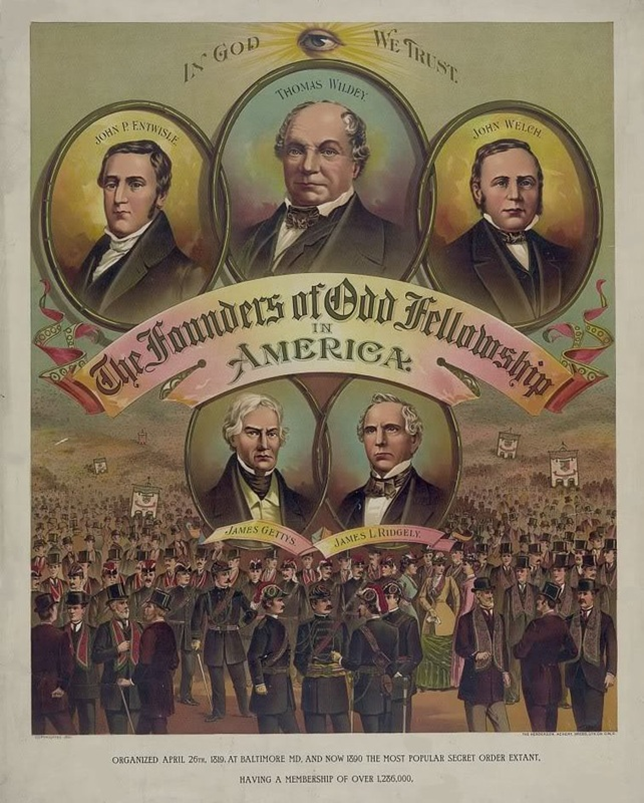
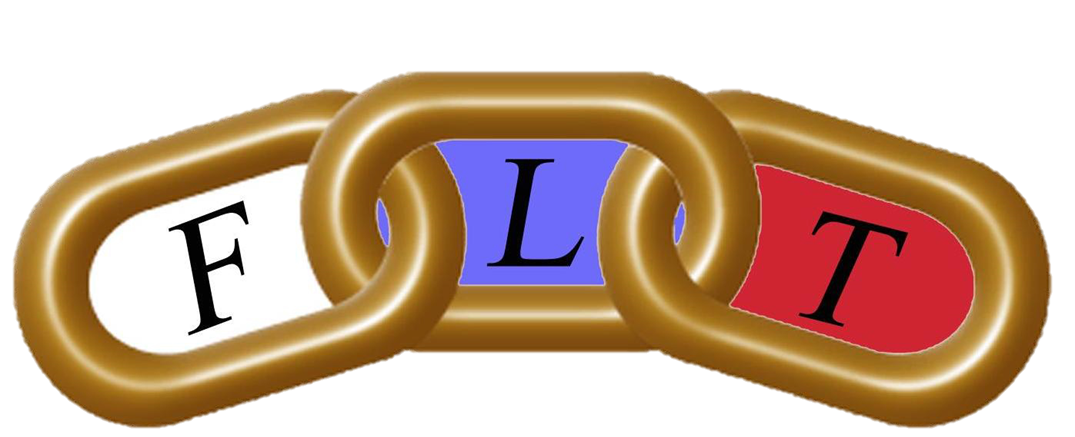
HISTORY OF ODD FELLOWSHIP

ODD FELLOWSHIP EXPANDS WEST
There were several abortive attempts to establish Odd Fellowship in the Western United States, beginning in the late 1840's. One of the first occurred when a member, leading a party sailing from Gloucester, Massachusetts, to what he called "the City of Oregon, on the Columbia River," obtained a charter through what was, at best, irregular channels. He had written to both the Grand Sire and the Grand Secretary of the Grand Lodge of the United States, after which he alleged that they had directed him to obtain necessary papers and authority from a Deputy Grand Sire in Massachusetts. Asked by the Deputy Grand Sire to see the letters, the Brother in question stated they had been packed by mistake, and were now on the ship, about to sail for Oregon. However, the ship and its party of Odd Fellows reached not the "City of Oregon," but the Sandwich Islands, and established the first Odd Fellows Lodge west of the Mississippi River, Excelsior Lodge No. 1, in Honolulu, Hawaii, with the charter signed by King Kamehameha, the reigning monarch of the Sandwich Islands which were later renamed the Hawaiian Islands.
There were several abortive attempts to establish Odd Fellowship in the Western United States, beginning in the late 1840's. One of the first occurred when a member, leading a party sailing from Gloucester, Massachusetts, to what he called "the City of Oregon, on the Columbia River," obtained a charter through what was, at best, irregular channels. He had written to both the Grand Sire and the Grand Secretary of the Grand Lodge of the United States, after which he alleged that they had directed him to obtain necessary papers and authority from a Deputy Grand Sire in Massachusetts. Asked by the Deputy Grand Sire to see the letters, the Brother in question stated they had been packed by mistake, and were now on the ship, about to sail for Oregon. However, the ship and its party of Odd Fellows reached not the "City of Oregon," but the Sandwich Islands, and established the first Odd Fellows Lodge west of the Mississippi River, Excelsior Lodge No. 1, in Honolulu, Hawaii, with the charter signed by King Kamehameha, the reigning monarch of the Sandwich Islands which were later renamed the Hawaiian Islands.
WHY THE NAME ODD FELLOWS
There are several different reasons given for our strange name. One old and apparently authoritative history of Odd Fellowship gives the explanation, "That common laboring men should associate themselves together and form a fraternity for social unity and fellowship and for mutual help was such a marked violation of the trends of the times (England in the 1700's) that they became known as 'peculiar' or 'odd,' and hence they were derided as 'Odd Fellows.' Because of the appropriateness of the name, those engaged in forming these unions accepted it. When legally incorporated the title 'Odd Fellows' was adopted." Another, similar explanation is that the original Odd Fellows were men who were engaged in various or odd trades, as there were organizations for some of the larger trades. Modern references state that the true reason for the name Odd Fellows isn't known or documented. Whatever the reason may have been, the unusual name has been the object of public curiosity (and on occasion derision or mirth) for well over 200 years.
There are several different reasons given for our strange name. One old and apparently authoritative history of Odd Fellowship gives the explanation, "That common laboring men should associate themselves together and form a fraternity for social unity and fellowship and for mutual help was such a marked violation of the trends of the times (England in the 1700's) that they became known as 'peculiar' or 'odd,' and hence they were derided as 'Odd Fellows.' Because of the appropriateness of the name, those engaged in forming these unions accepted it. When legally incorporated the title 'Odd Fellows' was adopted." Another, similar explanation is that the original Odd Fellows were men who were engaged in various or odd trades, as there were organizations for some of the larger trades. Modern references state that the true reason for the name Odd Fellows isn't known or documented. Whatever the reason may have been, the unusual name has been the object of public curiosity (and on occasion derision or mirth) for well over 200 years.
ODD FELLOWSHIP IN NORTH AMERICA
Among the first records of the Order in America is that of five Brothers of the English Order who met in New York City in 1806, and formed Shakespeare Lodge No. 1. The founders were three boat builders, a comedian and a vocalist - a group befitting the name "Odd Fellows," indeed. The lodge was self instituted, a common practice in those times. Their first candidate was a retired actor who was the keeper of the tavern where they met. Accounts state that lodge meetings were accompanied by merry making and mirth, and that the wares of the tavern were freely indulged in. This lodge was dissolved in 1813 due to poor attendance brought on by controversy over the War of 1812. Another lodge of which little is known existed briefly in New York in 1816. In 1818, Shakespeare Lodge in New York was re-instituted, in the Red Cow tavern, operated by a former member who had in his keeping the books and papers of the former lodge.
Among the first records of the Order in America is that of five Brothers of the English Order who met in New York City in 1806, and formed Shakespeare Lodge No. 1. The founders were three boat builders, a comedian and a vocalist - a group befitting the name "Odd Fellows," indeed. The lodge was self instituted, a common practice in those times. Their first candidate was a retired actor who was the keeper of the tavern where they met. Accounts state that lodge meetings were accompanied by merry making and mirth, and that the wares of the tavern were freely indulged in. This lodge was dissolved in 1813 due to poor attendance brought on by controversy over the War of 1812. Another lodge of which little is known existed briefly in New York in 1816. In 1818, Shakespeare Lodge in New York was re-instituted, in the Red Cow tavern, operated by a former member who had in his keeping the books and papers of the former lodge.
ODD FELLOWSHIP IN NORTH AMERICA
Among the first records of the Order in America is that of five Brothers of the English Order who met in New York City in 1806, and formed Shakespeare Lodge No. 1. The founders were three boat builders, a comedian and a vocalist - a group befitting the name "Odd Fellows," indeed. The lodge was self instituted, a common practice in those times. Their first candidate was a retired actor who was the keeper of the tavern where they met. Accounts state that lodge meetings were accompanied by merry making and mirth, and that the wares of the tavern were freely indulged in. This lodge was dissolved in 1813 due to poor attendance brought on by controversy over the War of 1812. Another lodge of which little is known existed briefly in New York in 1816. In 1818, Shakespeare Lodge in New York was re-instituted, in the Red Cow tavern, operated by a former member who had in his keeping the books and papers of the former lodge.
Among the first records of the Order in America is that of five Brothers of the English Order who met in New York City in 1806, and formed Shakespeare Lodge No. 1. The founders were three boat builders, a comedian and a vocalist - a group befitting the name "Odd Fellows," indeed. The lodge was self instituted, a common practice in those times. Their first candidate was a retired actor who was the keeper of the tavern where they met. Accounts state that lodge meetings were accompanied by merry making and mirth, and that the wares of the tavern were freely indulged in. This lodge was dissolved in 1813 due to poor attendance brought on by controversy over the War of 1812. Another lodge of which little is known existed briefly in New York in 1816. In 1818, Shakespeare Lodge in New York was re-instituted, in the Red Cow tavern, operated by a former member who had in his keeping the books and papers of the former lodge.
Does this make Odd Fellowship a secret society? Some church officials think it does, and believe the secrecy covers sinister doings in the lodge room. In reality, what comes after presentation of the flag and the opening prayer, and before retirement of the colors and the closing prayer, is a business meeting. The details of the meeting are not secret, but are the private business of the lodge. The normal business of the lodge includes reports on members who are ill or in need of help or prayers. During the rest of the meeting, the members discuss community projects that they might support with labor or money, and lodge fund-raising activities, such as a special dinner to raise money for the family of a city policeman killed in the line of duty, or a "Strike Out Arthritis" bowling tournament, and so forth.
Odd Fellowship started as a mutual benefit society in Industrial Revolution England. Many of the members were travelling laborers. If they ran into difficulties while on the road, they could call on the nearest lodge for assistance. There needed to be a consistent way to identify lodge brothers, in the interests of protecting the lodge treasury from impostors. Literacy was not high, which limited the usefulness of a written dues receipt. There was also the question about how to prove that the person asking for help was the person named on the receipt. If the person asking for help could prove his membership in the proper manner, he was eligible for assistance from the local lodge.
When the Order came to the United States, the mechanisms for proving membership came with it. As the country grew, brothers wandered and called on local lodges along their way for assistance. When the telegraph became available, a telegraph code was devised that could be used to send an inquiry to the home lodge shown on the dues receipt, without publishing a brother's private business over the public communications medium.
These days, lodges get very few calls for financial assistance from wandering members. There are many ways to prove a person's identification as a member. So the mechanisms no longer serve their original purpose. They are retained as part of our traditions and heritage, not as a means to exclude the public.
Odd Fellowship started as a mutual benefit society in Industrial Revolution England. Many of the members were travelling laborers. If they ran into difficulties while on the road, they could call on the nearest lodge for assistance. There needed to be a consistent way to identify lodge brothers, in the interests of protecting the lodge treasury from impostors. Literacy was not high, which limited the usefulness of a written dues receipt. There was also the question about how to prove that the person asking for help was the person named on the receipt. If the person asking for help could prove his membership in the proper manner, he was eligible for assistance from the local lodge.
When the Order came to the United States, the mechanisms for proving membership came with it. As the country grew, brothers wandered and called on local lodges along their way for assistance. When the telegraph became available, a telegraph code was devised that could be used to send an inquiry to the home lodge shown on the dues receipt, without publishing a brother's private business over the public communications medium.
These days, lodges get very few calls for financial assistance from wandering members. There are many ways to prove a person's identification as a member. So the mechanisms no longer serve their original purpose. They are retained as part of our traditions and heritage, not as a means to exclude the public.
The Mystery of Odd Fellowship Secrecy
Regular meetings of Odd Fellow and Rebekah Lodges are open only to members of the Order. Companies only invite their stockholders to stockholder meetings. Corporation Boards of Directors hold private meetings. Non-profit organizations that do not administer public funds can limit the attendance at their meetings. All that is different about an Odd Fellows Lodge meeting is that people go through an initiation ceremony to become members and we use an antique mechanism for checking membership before the meeting comes to order.
Regular meetings of Odd Fellow and Rebekah Lodges are open only to members of the Order. Companies only invite their stockholders to stockholder meetings. Corporation Boards of Directors hold private meetings. Non-profit organizations that do not administer public funds can limit the attendance at their meetings. All that is different about an Odd Fellows Lodge meeting is that people go through an initiation ceremony to become members and we use an antique mechanism for checking membership before the meeting comes to order.
"St. Louis Lodge No. 5"
INDEPENDENT ORDER OF ODD FELLOWS
FRIENDSHIP LOVE AND TRUTH
WELCOME TO OUR COMPANY

